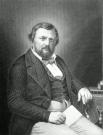Scientific materialism from 1850
The scientific materialism after 1850 , also called scientific materialism or pejoratively as vulgar materialism , is a variant of materialism , which since the mid- 19th century by scientists Carl Vogt , Ludwig Büchner and Jacob Moleschott was represented. These formed a radical and popular counter-movement to the philosophical system designs of German idealism and the socially dominant Christian worldview. They argued with the success of the rapid scientific and technical development of the 19th century as well as with the findings and conclusions of Charles Darwin's theory of evolution . The bridging of the gap between organic and inorganic chemistry through Friedrich Wöhler's synthesis of an organic substance ( urea ) was used by them as an argument against vitalistic and for materialistic approaches.
This variant of materialism, which was mainly represented in German-speaking countries, led to heated controversies in the materialism dispute. A dispute between Vogt and the physiologist Rudolf Wagner broke out in 1854 at the natural scientist meeting in Göttingen. In his lecture Human Creation and Soul Substance, Wagner considered the scientific results to be compatible with the biblical creation story and the doctrine of immortality and the rebirth of the soul. In response to Wagner's admission that he loved the “simple, simple belief in coal ”, Vogt responded in 1855 with the text “ belief in coal and science” , which quickly became popular.
Scientific materialism influenced the monist movement around Ernst Haeckel . Many contemporary philosophers criticized him for an epistemological naivete. In his very successful “History of Materialism”, published in 1866, the Neo-Kantian Friedrich Albert Lange only allowed materialism to be regarded as a research method, but not as a metaphysics and philosophical worldview.
In addition, influential criticism came from the camp of Marxism . Marx had conceived historical materialism around 1845, detached from Ludwig Feuerbach's materialism . From his point of view, scientific materialism was limited because it ignores social and ideological phenomena. It was therefore described by Friedrich Engels as (merely) “mechanical” or “mechanistic” materialism in the “flattened, vulgarized form in which the materialism of the 18th century persists in the minds of naturalists and doctors today and in the fifties was preached by Büchner, Vogt and Moleschott. ”Elsewhere, for example in his work Dialectic of Nature , which was only published posthumously in 1925 , Engels spoke of the“ vulgar travel preacher materialism of a Vogt and Büchner. ”Hence the term vulgar materialism, which was initially used by Marxist authors It was used polemically against non-Marxist or “petty bourgeois” representatives of materialist philosophy, but was also used beyond that, but was not included in the specialist dictionaries.
In the philosophy of the 20th century , the writings of scientific materialism received no greater attention. Secular intellectuals in the Ottoman Empire and Egypt were heavily influenced by him. Furthermore, parallels can be seen between scientific materialism and some variants of modern naturalism .
Major works
- Physiological Letters (1847)
- Charcoal belief and science (1854)
- Cycle of life (1852)
- Force and Matter (1855)
- New representation of sensualism (1855)
literature
- Christoph Kockerbeck (eds.): Carl Vogt, Jacob Moleschott, Ludwig Büchner, Ernst Haeckel: Correspondence. Marburg, Basilisken-Presse, 1999 ISBN 3-925347-50-X
- Kurt Bayertz , Walter Jaeschke, Myriam Gerhard (eds.): Weltanschauung, philosophy and natural science in the 19th century: The dispute over materialism: Volume 1 . Meiner, Hamburg 2007, ISBN 3-7873-1777-5
- Annette Wittkau-Horgby: Materialism , Vandenhoeck & Ruprecht, Göttingen 1998, ISBN 3-525-01375-2
- Fredrick Gregory: Scientific Materialism in Nineteenth Century Germany , Springer, Berlin a. a. 1977, ISBN 90-277-0760-X
- Hermann Misteli: Carl Vogt: his development from the budding scientific materialist to the ideal politician of the Paulskirche (1817–1849) , Gebr. Leemann, Zurich 1938
Individual evidence
- ↑ Friedrich Engels: Ludwig Feuerbach and the outcome of classical German philosophy. (1888); MEW Vol. 21, p. 278
- ↑ cf. MEW Vol. 20, p. 332
- ↑ Cf. Dieter Wittich (Ed.): Vogt, Moleschott, Büchner. Writings on petty-bourgeois materialism in Germany. Berlin / GDR. 2 volumes. 1971
-
↑ The lemma "vulgar materialism" is missing in:
the 12-volume historical dictionary of philosophy ;
the 3-volume handbook of basic philosophical concepts , ed. v. Hermann Krings et al .;
the dictionary of philosophical terms , founded by Kirchner / Michaelis (1907), also in the revised versions, currently published by Meiner ;
all editions of the Philosophical Dictionary , which has been published for a century, Heinrich Schmidt ;
of the 4-volume European Encyclopedia on Philosophy and Sciences , ed. v. Hans Jörg Sandkühler ;
general encyclopedias such as Brockhaus et al - ↑ Şükrü Hanioğlu: “Blueprints for a future society: late Ottoman materialists on science, religion, and art” in Elizabeth Özdalga (ed.): Late Ottoman society , London: 2005, pp. 28–116
